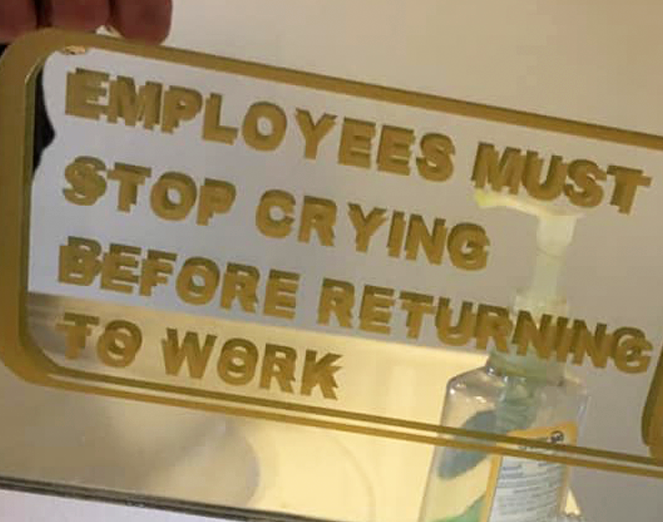One of us always tells lies. One of us only tells the truth.
- 0 Posts
- 80 Comments
Because President’s Day is for buying stuff. Clearly what we need is to allow stores to set up in polling places to get it to be a holiday. /s

 29·18 days ago
29·18 days agoOOTL: I’m confused. What is this? I’ve been using Firefox for years and I have no idea what this button is/was or why people would be annoyed by it.

 2·19 days ago
2·19 days agoThe links didn’t work either. But thanks for the suggestions. I’ll look into other app options.

 2·19 days ago
2·19 days agoIt depends. Usually I’m just looking for some game or show I like. The few of those I’ve looked into that have a community have like a handful of users, infrequent posts, or auto-posted threads with no comments beyond the bot post.
EDIT: Also, do you know how to get to your link on Memmy? For me it just brought me back to the main feed.

 3·19 days ago
3·19 days agoThe only real issue I have is that there aren’t that many active communities for more niche topics. I hope it’ll get there someday, but for now we have Linux or Star Trek, take your pick. :P

 28·23 days ago
28·23 days agoDid it really predict these things? We’ve had data surveillance and algorithmic targeting for a while before Watchdogs. A lot of “prescient” sci-fi is just writing about stuff that’s already happening but which people don’t pay much attention to.

 9·23 days ago
9·23 days agoI was thinking about this recently when I had to look at a website without an ad blocker. (Btw, does anyone know an Adblock option that works for iOS Lemmy? Memmy’s browser doesn’t block anything.)
The website was absolutely packed to the brim with ads. Animated, expanding, moving, etc. All competing for your attention. How can ANY of those ads be getting enough attention for it to be worth it?

 9·23 days ago
9·23 days agoYeah. It’s not hard to see why people don’t trust the media anymore. Amongst other things, the big ones I can think about in my life: They uncritically parroted lies the government used to justify the Iraq War and they regularly gave equal air time/consideration to climate deniers as though they were equivalent to climate scientists.
It’s still crazy to me how much of the bad shit the government has done has been declassified and publicly available and people still just kind of ignore it. Who needs censorship when people are just willing to overlook reality? Or even worse, just make up nonsense.

 1·30 days ago
1·30 days agoIt’s mostly just finding some reviews/word of mouth sources that you trust and which align with your tastes.
On the review side of things Second Wind covers a decent spread of indie games. I also occasionally see some new stuff from streamers, but that’s more of a toss up since there’s a lot of sponsored coverage.

 4·1 month ago
4·1 month agoI know you’re joking and that there’s a lot of garbage videos out there, but what possible value would there be in sending a novel per second? Can anyone read a novel per second? It only makes sense to use the higher bandwidth to send higher density information like video, audio, or interactive media like games.
My adblocking doesn’t work on twitch anymore, so I stopped using it for everything but one streamer I’m subbed to.
Tis the season for floating stuff in drinks. Summer by contrast is the season for putting stuff on the glass of your drink.

 9·1 month ago
9·1 month agoAnd if it took ads on the pause screen to get you to see the issues with growth capitalism,
I don’t know why you’d assume that. I’m pretty staunchly communist from a mix of seeing our current problems and understanding history enough to know that this didn’t start yesterday. But if it takes companies being really obviously greedy for some consumers to see anything is wrong, it doesn’t hurt to try to focus their anger to a productive understanding of the problem rather than whatever other nonsense they might get drawn to.
As far as alternatives. I’m always up front with people in saying that I don’t have precise answers for what our future ought to be after capitalism. That’s a difficult problem and up to everyone to work together to figure that out. But there is no future where we stick with capitalism. Or at least, not one we’d want to live in for very long. It’s a cruel system and it’s going to be responsible for ending the human habitable environment if we don’t do something about that. People need to understand this and they need to understand that tweaking around the edges isn’t going to fix the issue.
The thing about if they were ok with a reasonable profit is a thought experiment or rhetorical device more than it’s a proposed solution. It’d be nice if it worked that way. Capitalists want us to think things do or could work that way. Hence corporations saying they NEED to cut costs or raise prices while continuing to make increasing profits. But it’s important to understand why it could never work that way, at least for very long.

 16·1 month ago
16·1 month agoAgreed. I really hate it when people see the problems in the world, fall for misanthropy, and blame everyone, most of whom are blameless beyond their failure to put their lives at risk to change things.
People are great. We’ve done great things. We’re a species who’s defining advantage is cooperation. None of what we see today would be possible if most of us were greedy, hateful, idiots.
People can be lead astray. but who can blame them? We’ve created a world more complicated than any one of us could fully understand. It’s bad enough that a handful of psychopaths can take advantage of that, we don’t need to add to it by making it seem like everyone’s at fault for not instantly bashing their heads in.

 29·1 month ago
29·1 month agoI’m not terribly sympathetic to arguments about covering costs when it comes to corporations. If they were just looking to cover costs or even just make a reasonable profit, there are all sorts of arrangements we could come up with that would be acceptable to most people.
But they’re not trying to do that. Profit isn’t enough for a corporation. They need to make the most profit. And then after that they somehow need to make more than the most.
So they put in ads. But that’s not enough and oh look there are more places we haven’t put in ads, we should fix that. Oh look, our studies show that if we make the ads more obnoxious in these ways they increase this number by 3%. Oh wait, we have all this info we got from spying on people, why don’t we sell that too? Hey guys, we’ve heard you about the ads. Have we got a solution for you! For a small
protection paymentsubscription fee of $10/month, you can get rid of those pesky ads we know you don’t like! Oooh sorry everyone, the price of the subscription went up again. We promise this is all necessary. Oh by the way, we’re adding ads back into the service. But don’t worry, wait until you hear about our NEW subscription tier! (I don’t think that last one’s happened with YT premium yet, but it’s happened with cable and most of streaming at this point, so I wouldn’t put it past them.)There’s no way we can have nice things while this is the driving force organizing where our resources go.

 212·1 month ago
212·1 month agoImagine all the cool stuff we could be doing if we weren’t wasting the time of hundreds of engineers figuring out how to shove ads in people’s faces.
Wars are plenty profitable if you’re a lot bigger than your opponents and can force them to be subservient to your business interests. It’s not a fluke that the richest country on earth is also the one with the most frequent wars.




It’s just what you do when your side doesn’t have a justifiable platform on it’s own merit: See: All the people who keep telling us to ignore all the bad stuff corporate dems do because Trump would be worse.
IF you could actually run on things people liked, you’d talk about that and perhaps only call out your opponent’s opposition to the things you support or show how they might be lying about claims that they want similar things.
But when your core platform is “let rich people keep doing what they want,” you have to find ways to deflect from that.